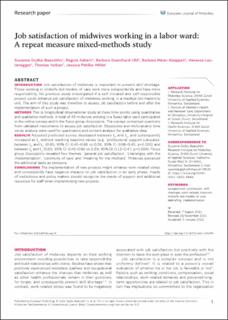Please use this identifier to cite or link to this item:
https://doi.org/10.21256/zhaw-24469Full metadata record
| DC Field | Value | Language |
|---|---|---|
| dc.contributor.author | Grylka, Susanne | - |
| dc.contributor.author | Aeberli, Regula | - |
| dc.contributor.author | Guenthard-Uhl, Barbara | - |
| dc.contributor.author | Meier-Kaeppeli, Barbara | - |
| dc.contributor.author | Leutenegger, Vanessa | - |
| dc.contributor.author | Volken, Thomas | - |
| dc.contributor.author | Pehlke-Milde, Jessica | - |
| dc.date.accessioned | 2022-03-04T13:00:12Z | - |
| dc.date.available | 2022-03-04T13:00:12Z | - |
| dc.date.issued | 2022-02-06 | - |
| dc.identifier.issn | 2585-2906 | de_CH |
| dc.identifier.uri | https://digitalcollection.zhaw.ch/handle/11475/24469 | - |
| dc.description.abstract | INTRODUCTION: Job satisfaction of midwives is important to prevent skill shortage. Those working in midwife-led models of care work more independently and have more responsibility. No previous study investigated if a self-initiated and self-responsible project could enhance job satisfaction of midwives working in a medical-led maternity unit. The aim of this study was therefore to assess job satisfaction before and after the implementation of such a project. METHODS: This is longitudinal observational study at three time points using quantitative and qualitative methods. A total of 43 midwives working in a Swiss labor ward participated in the online surveys and in the focus group discussions. The surveys comprised questions from validated instruments to assess job satisfaction. Descriptive and multivariable time series analysis were used for quantitative and content analysis for qualitative data. RESULTS: Adjusted predicted scores decreased between t0 and t1, and subsequently increased at t2 without reaching baseline values (e.g. ‘professional support subscales’ between t0 and t1: (0.65; 95% CI: 0.45–0.86 vs 0.26; 95% CI: 0.08–0.45, p=0.005) and between t0 and t2 (0.65; 95% CI: 0.45–0.86 vs 0.29; 95% CI: 0.12–0.47, p=0.004). Focus group discussions revealed four themes: ‘general job satisfaction’, ‘challenges with the implementation’, ‘continuity of care’ and ‘meaning for the mothers’. Midwives perceived the additional tasks as stressors. CONCLUSIONS: The implementation of new projects might enhance work-related stress and consequently have negative impacts on job satisfaction in an early phase. Heads of institutions and policy makers should recognize the needs of support and additional resources for staff when implementing new projects. | de_CH |
| dc.language.iso | en | de_CH |
| dc.publisher | European Publishing | de_CH |
| dc.relation.ispartof | European Journal of Midwifery | de_CH |
| dc.rights | https://creativecommons.org/licenses/by-nc/4.0/ | de_CH |
| dc.subject | Occupational satisfaction | de_CH |
| dc.subject | Skill shortage | de_CH |
| dc.subject | Work-related stressor | de_CH |
| dc.subject | Midwife-led model of care | de_CH |
| dc.subject | Debriefing | de_CH |
| dc.subject | Implementation | de_CH |
| dc.subject.ddc | 618: Geburtsmedizin und Hebammenarbeit | de_CH |
| dc.title | Job satisfaction of midwives working in a labor ward : a repeat measure mixed-methods study | de_CH |
| dc.type | Beitrag in wissenschaftlicher Zeitschrift | de_CH |
| dcterms.type | Text | de_CH |
| zhaw.departement | Gesundheit | de_CH |
| zhaw.organisationalunit | Institut für Hebammenwissenschaft und reproduktive Gesundheit (IHG) | de_CH |
| dc.identifier.doi | 10.18332/ejm/145494 | de_CH |
| dc.identifier.doi | 10.21256/zhaw-24469 | - |
| zhaw.funding.eu | No | de_CH |
| zhaw.issue | February | de_CH |
| zhaw.originated.zhaw | Yes | de_CH |
| zhaw.pages.start | 8 | de_CH |
| zhaw.publication.status | publishedVersion | de_CH |
| zhaw.volume | 6 | de_CH |
| zhaw.publication.review | Peer review (Publikation) | de_CH |
| zhaw.webfeed | G: Fachkräftemangel Gesundheitsberufe | de_CH |
| zhaw.funding.zhaw | Berufszufriedenheit Hebammen | de_CH |
| zhaw.author.additional | No | de_CH |
| zhaw.display.portrait | Yes | de_CH |
| Appears in collections: | Publikationen Gesundheit | |
Files in This Item:
| File | Description | Size | Format | |
|---|---|---|---|---|
| 2022_Grylka-Baeschlin-etal_Job-satisfaction-midwives-labor-ward_EJM.pdf | 400.72 kB | Adobe PDF |  View/Open |
Show simple item record
Grylka, S., Aeberli, R., Guenthard-Uhl, B., Meier-Kaeppeli, B., Leutenegger, V., Volken, T., & Pehlke-Milde, J. (2022). Job satisfaction of midwives working in a labor ward : a repeat measure mixed-methods study. European Journal of Midwifery, 6(February), 8. https://doi.org/10.18332/ejm/145494
Grylka, S. et al. (2022) ‘Job satisfaction of midwives working in a labor ward : a repeat measure mixed-methods study’, European Journal of Midwifery, 6(February), p. 8. Available at: https://doi.org/10.18332/ejm/145494.
S. Grylka et al., “Job satisfaction of midwives working in a labor ward : a repeat measure mixed-methods study,” European Journal of Midwifery, vol. 6, no. February, p. 8, Feb. 2022, doi: 10.18332/ejm/145494.
GRYLKA, Susanne, Regula AEBERLI, Barbara GUENTHARD-UHL, Barbara MEIER-KAEPPELI, Vanessa LEUTENEGGER, Thomas VOLKEN und Jessica PEHLKE-MILDE, 2022. Job satisfaction of midwives working in a labor ward : a repeat measure mixed-methods study. European Journal of Midwifery. 6 Februar 2022. Bd. 6, Nr. February, S. 8. DOI 10.18332/ejm/145494
Grylka, Susanne, Regula Aeberli, Barbara Guenthard-Uhl, Barbara Meier-Kaeppeli, Vanessa Leutenegger, Thomas Volken, and Jessica Pehlke-Milde. 2022. “Job Satisfaction of Midwives Working in a Labor Ward : A Repeat Measure Mixed-Methods Study.” European Journal of Midwifery 6 (February): 8. https://doi.org/10.18332/ejm/145494.
Grylka, Susanne, et al. “Job Satisfaction of Midwives Working in a Labor Ward : A Repeat Measure Mixed-Methods Study.” European Journal of Midwifery, vol. 6, no. February, Feb. 2022, p. 8, https://doi.org/10.18332/ejm/145494.
Items in DSpace are protected by copyright, with all rights reserved, unless otherwise indicated.